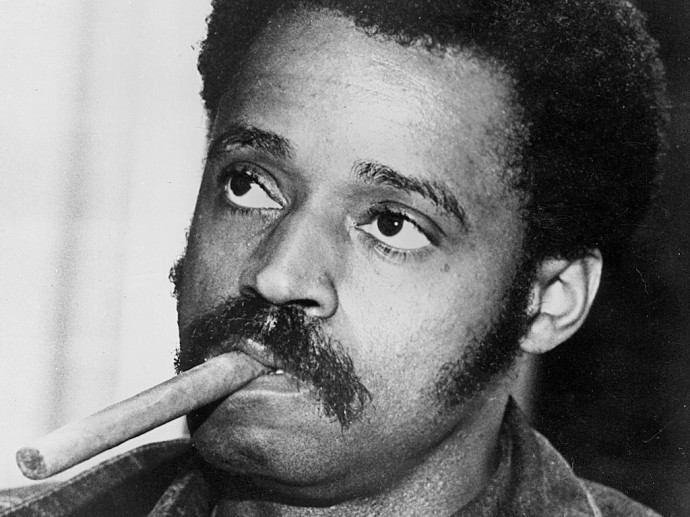Sweet Sweetback’s Baadasssss Song by Melvin Van Peebles (1971), or the birth of African-American protest in cinema.
Sweet Sweetback’s Baadasssss Song is a 1971 independent film, written, produced, scored, directed by and starring Melvin Van Peebles. The story, if there is such a thing to talk about since the narrative is often fairly rough and difficult to understand, unfolds the adventures of a young African-American named Sweetback (Melvin Van Peebles) as he struggles in his trife life and finally attempts to escape from society, hunted and chased down by white people. The movie holds in itself a very important meaning. It can be said that it is the first African-American movie that actually develops a subversive point of view on American society. Moreover, it also gave the argument for the growth of a movement that came to be known as Blaxploitation. However, we shall also discuss in this paper the reason of the failure of blaxploitation in its political dimension.
The first scene that I’d like to analyze here might be the most important, the most crucial one. Sweetback is one night arrested by two police officers who come at his work place (a whore house by the way, he’s a towel boy there). A black man was murdered and there is pressure from the African-American community to find a suspect. During the ride, they arrest a Black Panther who’s name is Mu-Mu. They handcuff him to Sweetback which causes Mu-Mu to insult the officers. They take both men out of the car, undo the handcuffs on Mu-Mu’s hand and start to beat Mu-Mu senseless. The characters are then completely devoured by the darkness surrounding them. Sweetback can’t take it anymore and decides to smash the officers’ heads with his handcuffs. That is the moment I’m talking about. For the first time a black man in an American movie witnesses police brutality on a fellow brother and he kills the officers. Of course I’m not going to raise moral or ethical issues here, that’s far from the point. The idea is to strike down a hated foe using the tools of slavery against them, namely the handcuffs. The metaphor is clear, the slave uses his chains to free himself.
A brilliant expression by the great Malcolm comes to mind: “the ballot or the bullet”. Here, Melvin Van Peebles clearly chose the bullet. His character, who is not a Black Panther or a political activist, decides to cross the line and take action. The movie thus distances itself from the integrationist approach, embodied by Martin Luther King. The message of the film could actually be summed up by this sentence which is dropped during the opening credits: “to all the Brothers and Sisters who had enough of the Man”. The “Man” probably designating the White Man. We are here talking about the content of the film, but perhaps the most subversive aspect would be the formal dimension, the way the movie is done, edited, directed.
In order to do a subversive movie in the USA, one might argue that you also need to break away from the dominant ideology: Hollywood. Van Peebles directed an independent movie, he decided that he needed to find new ways of editing and recounting a story in order to emancipate himself from the dominant ideology. It is why he conceived his editing as if he was writing jazz music and researched a fair amount of visual effects and strategies: numerous jump-cuts, fast-paced editing, weird camera angles, superimpositions, extreme zooms, stop motion. These elements constitute a style that was uncanny given the codes of the American cinema that insist on transparency. There is an overall improvisational quality to the movie, as stated by the critic Stephen Holden from The New York Times. In order to further separate himself from the dominant ideology he despised, Van Peebles wanted most of his crew to be third world people, even if it meant dealing with inexperienced people at times.
Sex is also one of the means used by Van Peebles to distance himself from the prudishness of the average Hollywood productions. Sweetback is known in the whore house for his vigor in bed and the size of his penis. The opening scene shows us a very young Sweetback losing his virginity to one of the prostitutes, they are the ones who give him the nickname Sweet Sweetback because of his sexual performance. During his escape, after having killed the officers, he gets himself out of a pinch when surrounded by a motorcycle gang of women. Indeed, he has sex with the leader, one might say with irony that he fucks his way out. However, event though it is a major aspect of blaxploitation, the increase of pornographic productions will quickly erase that subversive dimension of these movies, even this one. Moreover, while it might be true that Sweet Sweetback’s Baadasssss Song is the first example of a truly brutal and subversive African-American movie, the others films such as Shaft or Super Fly do not belong to the same school of thought. These are genre movies, at best. There is no real political message, quite the contrary one might argue that it conveys a fair amount of stereotypes concerning black people.
In the end, we might distinguish two different paths when we study African-American cinema. One is the path chosen by Melvin Van Peebles, and later by his son Mario as well as Spike Lee (though I acknowledge that Mario’s movies are far from good, but they do represent something). In other words, the kind of movie which is celebrated by Huey P. Newton (which was the case for Van Peebles’ movie). On the other hand, you have movies which closely resemble The Realization of a Negro’s Ambition (1916): a young negro oil engineer rescues a white woman and earns the chance to succeed in the oil business. Here we have a movie directed by an African-American that gives a eulogy of the establishment. The way to succeed is to follow the American dream, accept the dominant ideology. A basic and perhaps too simplistic comparison would be to oppose Martin Luther King and Malcolm X: two models, two visions, one preaches integration, the other refuses to make any compromise. Of course, your humble servant will not take a stand here but you might have guessed where I’m leaning towards.







